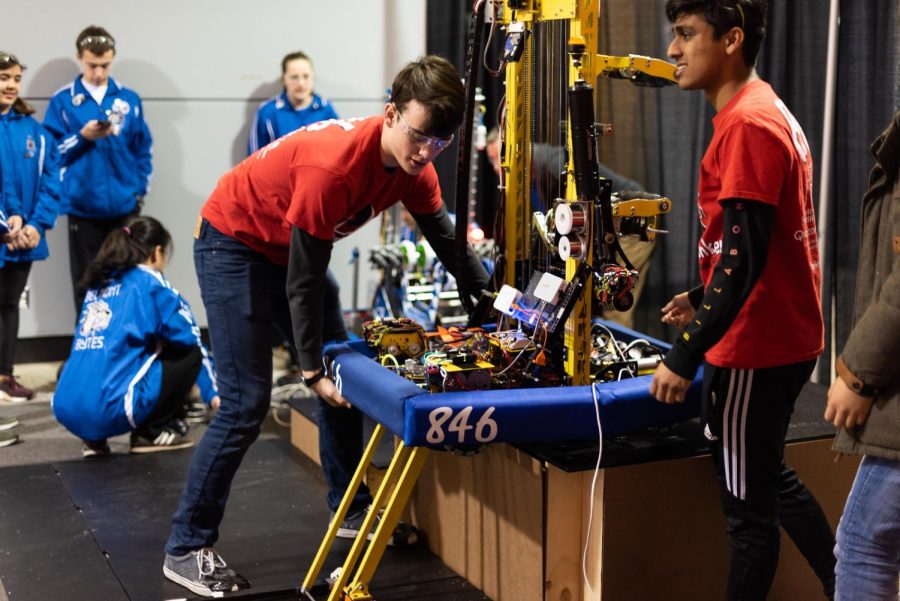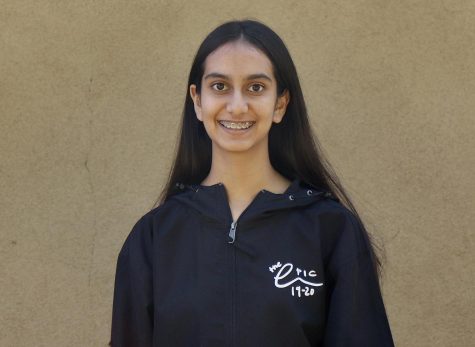Lynbrook Funky Monkeys program their way to World Championships
May 3, 2019
SpaceRex, the four foot and 150 pound robot built by the Lynbrook Funky Monkeys robotics team, powered the team to win four awards this season, place second at the Canadian Pacific Regional Robotics Competition, enter the elimination round of Silicon Valley Regional Robotics Competition ranked number one out of 59 teams and earn an opportunity to compete at the World Championships in Houston from April 17 to 20.
With 112 registered members, the Funky Monkeys build and design a robot each year to compete in the FIRST Robotics Competition, an international organization through which high school robotics teams from around the world compete in robotics. Beside the World Championships, the team competed in the Canadian Pacific Regional Robotics Competition and the Silicon Valley Regional Robotics Competition this year, both of which took place during the month of March.
“I really like being part of a group of people who work together to complete a challenge,” said sophomore Isha Venkatesh, co-electrical lead of the Lynbrook robotics team. “It’s really rewarding to see a working product that is a result of so many people putting their effort and time into making it.”
Prior to competing, the Funky Monkeys have a six-week build season from the beginning of January to mid-February, during which they prepare all aspects of the robot: software, hardware, design, mechanical and electrical subsystems. During this time, the team usually meets for about five hours per day on weekdays and six hours per day on weekends. At the end of build season, the robot is disassembled into to two pieces, placed in a sealed bag and kept unmodified until competition day. The team’s after-school meetings are reduced to four hours during competition season, which directly follows build season and lasts until the end of April. Its competitive preparation includes developing 30 pounds of additional parts which will be attached to the robot at the competition.
“I can’t quite figure how the robotics students do so well in school considering the 20 to 40 hours they are dedicating to robotics per week,” said David Giandomenico, the head of coach of the Lynbrook Funky Monkeys, who has been one of their mentors for 16 years. “At the same time, by putting hours into robotics, the students are learning something that you don’t get in academics.”
The first competition that the team participated in during the 2019 season was the Canada Pacific Regional Robotics Competition, which it attended for the first time. At competitions, the first day is usually used to assemble the robot, make last-minute design changes, run maintenance and practice driving the robot on the competition field. But going into this competition, the team felt considerably unprepared because its robot was yet to be assembled and some of the parts were not functioning correctly.
“When we got [to Canada], our robot was in two pieces, there were no electronics in it and it did not work at all,” said senior and Funky Monkeys secretary Aayush Shah. “We spent the entire day assembling the robot and running maintenance.”
Consequently, the drivers missed any chance they had to practice driving their robot before the competition. Official qualification matches are held on the second day of a robotics competition, where robots must complete challenges related to FIRST Robotics Competition’s annual theme, this year’s being Deep Space. Challenges included having the robot place rubber balls into holes on a rocket and patch the holes up using hatch panels, or polycarbonate discs, and climb a three-feet platform without any external support. Throughout the first half of the second day, teams are randomly assigned to groups of three and compete in three versus three matches. A team’s ranking increases based on its performance how many points it scores in qualification matches, which are awarded for successfully completing the challenges.
As they did not have time to compete in practice matches, the qualification round was the first time that the Lynbrook drivers touched the competition field. Nevertheless, they significantly improved over the course of the day, and the team ended up ranking second out of the 36 teams competing. The Funky Monkeys were among the top eight teams to advance to the elimination round. After winning their quarter-final and semi-final matches, the Funky Monkeys lost in the finals, but earned a spot to compete at the World Championships in Houston for the second year in a row. They won the Autonomous Award sponsored by Ford and the Woodie Flowers Finalist Award in the process. The team earned the Autonomous Award because it demonstrated consistent, reliable, high-performance robot operation during autonomously managed actions and Woodie Flowers Finalist Award was presented to Funky Monkeys mentor Payton Wong for leading, inspiring, teaching and empowering their team using excellent communication skills.
“During our semifinals match, I was freaking out on the inside,” said senior James Jiao, Funky Monkeys co-president and robot driver. “Somehow, we pulled it together and did really well. It was a surreal experience.”
Following the Canada Pacific Regional Robotics Competition, Lynbrook Robotics competed in the Silicon Valley Regional Robotics Competition from March 29 to 31. This competition was primarily for the team to practice driving, tune the robot and make sure everything was running smoothly because it had already qualified for World Championships.
“We were more comfortable because we could take our time to make sure everything was running properly,” Shah said. “When we made mistakes, we could approach them as learning opportunities and improve on them for at World Championships; we didn’t have to freak out about slapping together a fix. Because we felt more comfortable, it allowed us to perform at a really high level.”
Although they lost in their semi-final match during the elimination round of the Silicon Valley Regional, the Funky Monkeys went undefeated in the qualification matches. Consequently, for the first time in the team’s 18-year history, it entered the elimination round ranked first out of 59 total local and international teams. The team also won the Quality Award sponsored by Motorola Solutions Foundation, which celebrates machine robustness in concept and fabrication.
To prepare for the World Championships, the team continued to practice driving the robot, run maintenance and find ways to improve the robot design to ensure that it was completely ready to compete. Specifically, they changed mechanisms for the challenge that involved rubber balls and hatch panels. As a result, the robot drivers did not have a lot of practice controlling the robot with this new mechanism. However, this was only a minor setback and after a few matches, the drivers quickly became comfortable with maneuvering the improved robot.
Due to the number of teams competing at the World Championships, the competition utilized a system where teams were randomly assigned to divisions and in order to advance to the elimination round, a team had to win in its respective division. After placing sixth in a division of 67 total teams, the Funky Monkeys won against the fourth ranked team in their division quarter-finals but lost to the number two team, MadTown Robotics, in the division semifinals. The Lynbrook team won one out of three matches against MadTown, however, it takes pride in winning even one, as Madtown Robotics proceeded to win the World Championships.
“It was unbelievable because we beat one of the best teams [at the match], said senior Eesha Deepak, Vice President of the Funky Monkeys. “We realized that we are capable of achieving that. If we try even harder next time, we can possibly win in the future.”
Moreover, the team won the Excellence in Engineering Award, sponsored by Delphi, which is awarded to the team that creates an elegant and advantageous machine feature for their robot.
“I’m extremely proud of our students for accomplishing what they have because the students have complete ownership over the parts that they build,” Giandomenico said. “It’s not like somebody else built the robot for the students, and they are just talking about it. It is very exciting to see how much the students have learned and their ability to describe what they have built.”
From not qualifying for World Championships at all two years ago, to winning a match against the best team at World Championships this year, the Funky Monkeys have improved immensely over the past few years. They placed second at Canadian Pacific Regional Robotics Competition and went undefeated in the qualification round at the Silicon Valley Regional Robotics Competition. Winning four awards in three competitions, the Lynbrook robotics team met a lot of success this year that will hopefully continue to follow it in future years. Going forward, the Funky Monkeys hope for improved resources that can enable them to go further in competitions.
“It’s never a level playing field,” Giandomenico said. “Some teams have a wide variety of resources and I would like to have much more here. I look at Lynbrook as one of the top schools in California, especially among public schools especially I want the Lynbrook robotics program to show what California public schools are capable of doing.”




























































